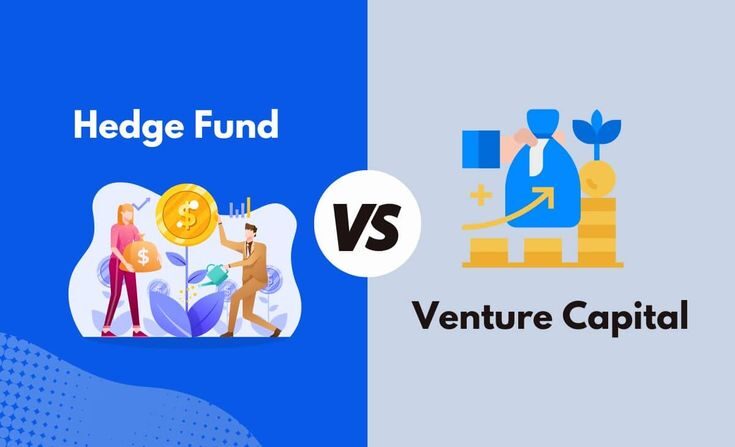Hedge Fund vs Venture Capital- Best Differences Expained In 2025
Table of Contents
Hedge Fund Vs Venture Capital-The Detailed comparison

Are you searching for the best comparison of Hedge fund vs Venture capital, then this destination is what you need. While both hedge funds and venture capital (VC) are important players in the alternative investment landscape, they differ fundamentally in their investment focus, strategy, risk, and investor profile. Understanding these differences helps investors choose the right vehicle based on their goals and risk tolerance.
What is a Hedge Fund?
A hedge fund is a pooled investment fund that employs a variety of strategies to generate returns for its investors. Hedge funds invest in publicly traded securities, derivatives, currencies, commodities, and sometimes private assets. Their goal is to achieve positive returns regardless of market conditions by taking both long and short positions, using leverage, arbitrage, and other sophisticated trading techniques.
Key Characteristics of Hedge Funds:
- Invest mainly in public markets but can access private deals
- Use a wide range of strategies: long/short equity, global macro, event-driven, arbitrage, quantitative trading
- Aim for absolute returns, often hedging to reduce risk
- Typically have high liquidity with quarterly or annual redemption windows
- Suitable for investors seeking diversified, flexible strategies
What is Venture Capital?
Venture Capital is a form of private equity focused on investing in early-stage startups with high growth potential. VC firms provide funding in exchange for equity ownership, helping startups scale by offering capital, mentorship, and strategic advice. Due to the high risk of startup failure, VC investments are long-term and illiquid.
Key Characteristics of Venture Capital
- Invests in private startups and early-stage companies
- Takes minority ownership stakes
- High risk but potential for exponential returns
- Long investment horizon (7–10+ years)
- Provides strategic support and mentorship beyond capital
Detailed Differences Between Hedge Funds and Venture Capital
1. Investment Focus
Hedge Funds
Hedge funds primarily invest in publicly traded securities such as stocks, bonds, derivatives, currencies, and commodities. They capitalize on market fluctuations and inefficiencies across global financial markets. Occasionally, hedge funds may take positions in private companies or distressed assets, but their core investments remain liquid and publicly accessible.
Venture Capital
Venture capital strictly focuses on private, early-stage companies. These startups often have innovative business models or technologies but lack a proven track record or stable revenue streams. VC invests at the ground floor, providing capital for product development, market entry, and business scaling. These companies are usually not listed on any public exchange and are illiquid.
2. Investment Strategy
Hedge Funds
Hedge fund managers use a wide range of strategies tailored to generate absolute returns, meaning they aim to make money regardless of whether markets rise or fall. Common strategies include:
- Long/Short Equity: Buying undervalued stocks (long) and shorting overvalued stocks to profit from relative price movements.
- Global Macro: Trading currencies, commodities, and bonds based on macroeconomic trends worldwide.
- Event-Driven: Investing around corporate events such as mergers, acquisitions, or restructurings.
- Arbitrage: Exploiting price differences between related financial instruments.
- Quantitative Trading: Using computer algorithms and statistical models to identify trading opportunities.
This diversity allows hedge funds to adjust quickly to market changes and seek steady returns with some downside protection.
Venture Capital
VC firms follow a long-term equity investment strategy focused on nurturing startups. They provide capital in exchange for equity stakes and play an active role in helping these companies grow by offering strategic advice, business expertise, and networking opportunities. VC investments are illiquid and require patience, as startups may take years to mature or exit.
3. Risk Profile
Hedge Funds
Though hedge funds employ leverage and complex trading strategies, their risk is typically moderate and actively managed through hedging techniques. They strive to reduce downside exposure and volatility by diversifying across asset classes and markets.
Venture Capital
VC investments are inherently high risk due to the uncertainty surrounding startups. Many ventures fail to achieve profitability or scale, resulting in complete loss of capital. However, the few successful companies can deliver outsized returns, compensating for losses.
4. Liquidity
Hedge Funds
Investors in hedge funds generally enjoy higher liquidity compared to VC, with redemption options quarterly, semi-annually, or annually. However, lock-up periods or notice requirements may apply to prevent sudden fund withdrawals.
Venture Capital
VC investments are illiquid and locked in until a liquidity event occurs, such as an Initial Public Offering (IPO) or acquisition. Typical holding periods span 7 to 10 years or more, requiring investors to commit capital for long durations.
5. Investor Involvement
Hedge Funds
Investors in hedge funds are mostly passive; fund managers make all investment decisions and trading activities. Investors rely on the expertise of hedge fund managers but have little influence over individual investments.
Venture Capital
VC investors often take an active role beyond capital provision. They may sit on company boards, advise on strategy, assist with hiring, and leverage networks to accelerate growth. This hands-on involvement is vital to help startups succeed.
6. Return Profile
Hedge Funds
Returns from hedge funds tend to be moderate and steady, aiming to outperform benchmarks and deliver positive gains regardless of market cycles. Due to diversification and hedging, returns are usually less volatile.
Venture Capital
VC returns are highly variable and volatile. While many investments may fail or produce modest returns, successful ventures can generate exponential gains, sometimes multiplying initial investments several times over.
7. Time Horizon
Hedge Funds
Investment horizons in hedge funds are generally short to medium-term. Many hedge funds target annual or quarterly returns and allow investor redemptions periodically.
Venture Capital
VC investments have a long-term horizon, often 7 to 10 years or more, reflecting the time needed for startups to mature, grow, and reach exit events.
8. Fee Structures
Hedge Funds
Typically operate on a “2 and 20” fee model: a 2% annual management fee on assets under management and a 20% performance fee on profits earned. Fee structures may vary depending on fund strategy and size.
Venture Capital
Similarly, VC funds charge around 2% management fees and 20% carried interest (performance fee on profits). However, management fees are often lower after the investment period, and carried interest is realized only upon successful exits.
9. Investor Eligibility
Both hedge funds and venture capital funds generally require investors to be accredited or institutional, due to the complexity, risk, and high minimum investment thresholds. However, recent regulatory changes and crowdfunding platforms have begun to open limited access to a broader investor base.
Summary Table
| Aspect | Hedge Funds | Venture Capital |
| Investment Focus | Public markets, liquid assets | Private startups, illiquid equity |
| Investment Strategy | Active trading, hedging, leverage | Long-term equity in growth companies |
| Risk Profile | Variable; hedged for downside | High risk due to startup failure |
| Liquidity | Typically quarterly or annual redemption | Locked for years until exit |
| Investor Role | Limited involvement | Active support, mentorship |
| Typical Returns | Moderate, steady returns | Potentially very high but volatile |
| Minimum Investment | High minimums, accredited investors | High minimums, accredited investors |
| Time Horizon | Short to medium-term | Long-term (7–10+ years) |
How Hedge Funds and Venture Capital Make Money
Hedge Funds
Profit by capitalizing on market inefficiencies and trends through complex strategies, aiming for absolute returns regardless of market direction.
Venture Capital
Earn returns by investing early in startups that scale rapidly and exit via IPOs or acquisitions, realizing capital gains on equity stakes.
Who Should Invest in Hedge Funds or Venture Capital?
Hedge Funds
Ideal for investors seeking liquid, actively managed investments in public markets with moderate risk. Suitable for those wanting diversified exposure across asset classes and the ability to exit investments periodically.
Venture Capital
Best suited for investors with high risk tolerance and a long-term outlook. VC investors often seek to support innovation and are comfortable with illiquidity and potential losses in exchange for the chance at significant gains.
Conclusion
Hedge funds and venture capital both offer access to alternative investments but serve different purposes. Hedge funds focus on liquid markets, active management, and consistent returns, while venture capital emphasizes early-stage innovation, high risk, and long-term growth. Knowing these differences can help you align investments with your financial goals and risk appetite.
FAQs: Hedge Fund vs Venture Capital
1. What is the main difference between a hedge fund and a venture capital firm?
The main difference lies in the investment focus. Hedge funds invest in public, liquid assets and use active trading strategies, while venture capital firms invest in early-stage private companies and hold long-term equity positions to support business growth.
2. Which is riskier: hedge funds or venture capital?
Venture capital is generally riskier because it involves investing in startups with high failure rates. Hedge funds, though complex, often manage risk actively using hedging and diversification strategies in public markets.
3. Can individual investors invest in hedge funds or venture capital?
Usually, only accredited investors or institutions can invest in hedge funds and venture capital due to regulatory restrictions and high minimum investment requirements. However, some newer platforms are democratizing access with lower thresholds.
4. Which gives higher returns: hedge funds or venture capital?
Venture capital has the potential for higher returns, especially if a startup succeeds or goes public. Hedge funds aim for consistent, moderate returns with lower volatility, rather than exponential growth.
5. What is the time horizon for hedge funds vs venture capital investments?
Hedge funds generally have short to medium-term horizons (monthly to a few years), with periodic redemption options. Venture capital investments are long-term, often locked in for 7–10+ years until a company exits through IPO or acquisition.
6. Do hedge funds invest in startups like venture capital firms?
Typically no. Hedge funds focus on liquid public securities. However, some hedge funds with flexible mandates may allocate a small portion to late-stage private companies or pre-IPO investments.
7. What are the fee structures for hedge funds and venture capital funds?
Both often follow a “2 and 20” model: 2% annual management fee and 20% performance fee on profits. VC carried interest is realized only on successful exits, whereas hedge funds may charge performance fees annually.
8. Which is more liquid: hedge funds or venture capital?
Hedge funds are more liquid, offering redemption options quarterly or annually. Venture capital is highly illiquid, with no exit until a startup is acquired or goes public, which may take several years.
9. How do hedge funds and venture capital firms create value?
Hedge funds create value through active market trading strategies that exploit inefficiencies. Venture capital creates value by nurturing startups, providing capital, mentorship, and strategic support to grow businesses.
10. Is hedge fund or venture capital better for portfolio diversification?
Both offer diversification, but in different ways. Hedge funds diversify by investing across asset classes and using dynamic strategies. Venture capital adds exposure to innovative startups and private markets, which are less correlated with traditional investments.






